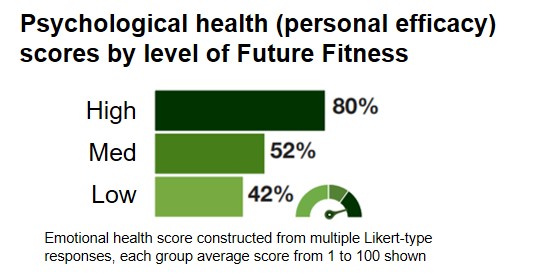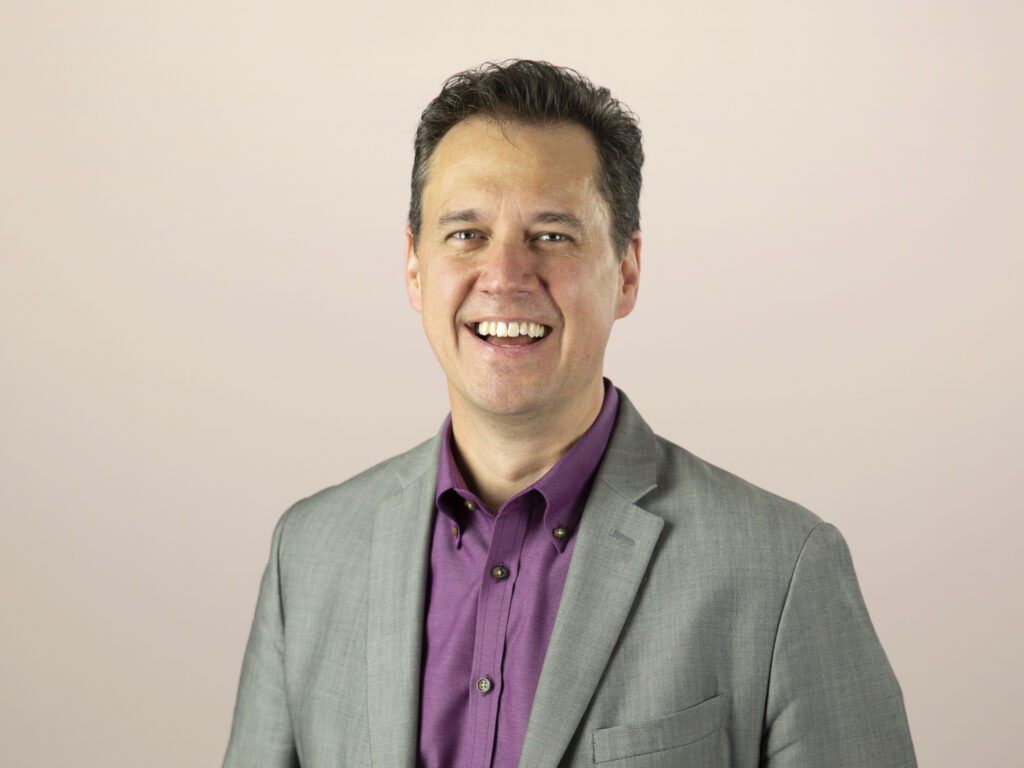Psychological Health: A Mental Tool For Approaching Your Future
Forrester Future Fit is a tool for measuring your readiness for the future. A simple, five-minute assessment lets us statistically project whether you are in the high-, medium-, or low-fitness group. Take the survey at futurefit.life to learn your score. Read more about future fitness here. You’ll find that there are nine key attributes of future fitness that you can focus on and improve. In this post, we dive deep into the third of those nine key attributes: psychological health.
Future fitness measures nine key attributes of your personal readiness for the future. The first three attributes all have a crucial thing in common: They all include the word “health.” We’re used to talking about health as a single dial. We go up or down in health. But of course, it’s more interesting than that, and in the yearlong effort we undertook to build the Forrester Future Fit assessment tool, we scrutinized our understanding of what health is and how it can predict or assist your readiness for the future. Our statistical analysis yielded three different measures of health — each correlated with the others but distinct enough that they can vary independently. The three are physical, emotional, and psychological health.
Choosing the term psychological health to describe this particular attribute took some deliberation. In our survey work, we don’t conduct a psychological evaluation; there are no Rorschach inkblots to describe. Instead, under the term psychological health, we are capturing whether your personal psychology enhances or inhibits your ability to navigate the future. The term for this in psychological literature is personal efficacy. Think of efficacy as a tool for approaching new situations — in this case, your future.

A high-efficacy individual is a person who can, when novel situations arise, coolly interpret the facts of the situation as they present themselves, calculate the resources they have to offer, and formulate a response. Efficacy neatly complements your physical and emotional health, even as it depends on them to function well.
These three resources are the first attributes of future fitness because you draw from them to increase your access to the six remaining attributes, things such as agility or curiosity. Drain these three foundational resources, and you simply can’t approach challenging tasks with as much aplomb. Instead, you would perceive challenging tasks as threats, as depletion events that can leave you exhausted. Ideally, you want to be high on all three, but they can compensate somewhat for each other — if you are high on two of them but low on the third, you are still equipped with more capacity than the average person, and it will show in how you approach the future.
Because efficacy is a mental tool, however, it is not simply a store of energy you draw from. Instead, it is a cognitive propensity that helps you allocate the resources you have toward specific problems in more productive ways. If you have high psychological health or high personal efficacy, your brain resists the impulse to sound a general panic alarm when a problem comes your way. Instead, it helps you calculate in a more rational way what this problem will require and helps you prioritize your response to the problem in its proper context. That’s not to say it’s devoid of emotion. As we discussed before, having emotional health means that you actually experience more emotion on average. But your ability to interrogate your emotions, using your psychological health and reinforced by your physical health, is higher. That aligns your energy, your motivation, and your response.
How does one improve psychological health? Unlike propping up mere self-regard, which can be unfounded and doesn’t predict actual effectiveness, psychological health rises as you choose to tackle and accomplish important tasks. There are two parts to this: (A) proving yourself to yourself and (B) reframing your agency. The first is obvious; we develop psychological health as a tool when we accomplish things. If we are enmeshed in processes at work that seem to spin forever and never provide a sense of accomplishment, our work processes need to be improved. But we don’t have to wait for that. In our personal lives, we can set goals that require discipline and mastery and accomplish them, whether running a 5K or learning how to knit a sweater.
The second is subtler than that; reframing your agency means training yourself to see that your life gives you opportunities to act as well as opportunities to be acted upon. As cognitive behavioral therapy practitioners know, people who frame their circumstances as out of their control, where they see themselves as subject to the decisions and demands of others, surrender their agency to external sources. Inevitably, their personal efficacy diminishes. You can see why such an attitude would make it harder to confidently approach the future — constantly looking for others to shape your future for you or to protect you from the worst possible future scenarios will ensure that you don’t approach the future ready to shape it.
Prove yourself to yourself and learn to see yourself as the principal agent of your own life, and your psychological health will increase — then you can expand the future.
_________
James McQuivey, PhD is a vice president and principal analyst at Forrester. He is also the author of the book Digital Disruption: Unleashing the Next Wave of Innovation.
